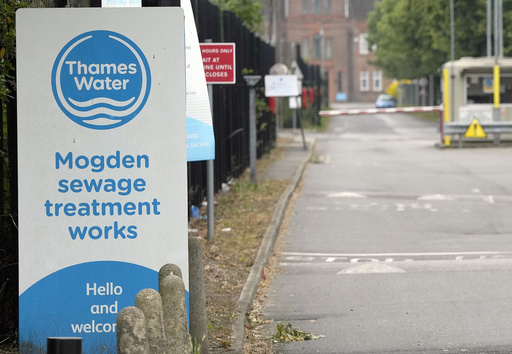LONDON — On Tuesday, a judge sanctioned an urgent plan aimed at ensuring the survival of the largest water provider in Britain, Thames Water, thereby dodging the risk of a temporary government intervention. This company caters to around 16 million customers within London and its vicinity, and is in need of judicial approval for approximately £3 billion (around $3.8 billion) in loans intended to rescue it from a financial crisis anticipated next month.
Justice Thomas Leech of the High Court in London determined that the company’s strategy for restructuring presents a more favorable option for the public compared to allowing Thames Water to reach insolvency or endorsing an alternative proposal backed by a smaller group of investors. “There exists a public interest in favor of reviving the Thames Water Group and allowing the market an opportunity to agree upon a permanent restructuring solution before the government is compelled to appoint a special administrator,” Leech remarked.
The judge has provided an opportunity for appeal from a minority group of creditors who argue that their plan would be a more financially prudent choice, as well as from a member of Parliament advocating for government intervention. Should Thames Water fail to secure the necessary funds, it risks depleting its finances by next month, potentially necessitating government intervention. Nevertheless, both Thames Water and government officials have reassured that water supplies will remain uninterrupted regardless of the outcome.
Thames Water’s chairman, Adrian Montague, praised the decision as a “significant milestone” in efforts to bolster the company’s financial posture. The firm has drawn considerable ire from both customers and government representatives, many of whom claim that mismanagement led to its current troubles. Critics accuse the company of lavishly rewarding investors and executives while neglecting critical infrastructure investment in pipes, pumps, and reservoirs.
Company representatives, however, contend that the blame lies with regulatory bodies that have kept consumer charges too low for an extended period, thus depriving Thames Water of necessary funds for vital upgrades. The water and wastewater sector has been subjected to national scrutiny, particularly due to the unfortunate prevalence of sewage spills affecting rivers and coastal areas.
Charles Watson, chairman of the environmental organization River Action, decried the situation as “a national scandal” that damages both Thames Water customers and the environment. He criticized the decision to bail out the company, asserting it ultimately shifts the burden of financing the needed improvements onto customers, while allowing executives and shareholders to evade accountability.
In December, Ofwat, which oversees water companies in England and Wales, sanctioned a 35% rise in Thames Water’s customer rates over the next five years. The company maintains that a 53% hike is essential to fund significant projects and yield the returns necessary to attract investors. Thames Water is currently facing hefty sanctions for sewage violations, including an August fine exceeding £100 million ($126 million) imposed by Ofwat for inadequate wastewater management.
Justice Leech considered competing financial proposals: one presented by Thames Water and another supported by a smaller faction that argued the company’s plan was too costly and benefited larger investors disproportionately. A majority of the company’s creditors endorsed Thames Water’s proposal.
Opponents of the restructuring plan pointed to the steep interest rate of 9.75%, which they believe would unduly benefit the loan-making creditors, a concern noted by Leech. “The costs associated with financing and advisory services in this instance are exceptionally high and could be deemed exorbitant,” noted the judge. “Half of the prescribed loans merely circulate back to the plan creditors.”
Despite the criticisms of the financial structure, Leech stated that the government administration alternative was less favorable than the proposed restructuring plan. Meanwhile, Charlie Maynard, a Liberal Democrat MP who advocated for government oversight during court proceedings, declared his intention to appeal the ruling, questioning the long-term viability of this short-term financial rescue. “This restructuring merely perpetuates a cycle of throwing good money after bad,” Maynard asserted. “The funds derived from our bills are urgently needed to repair water infrastructures, enhance customer service, and address river pollution.”
